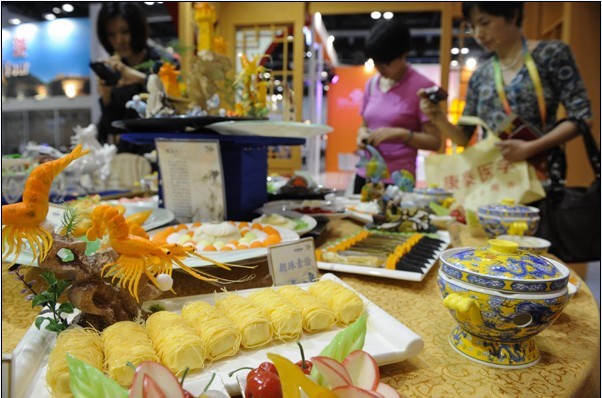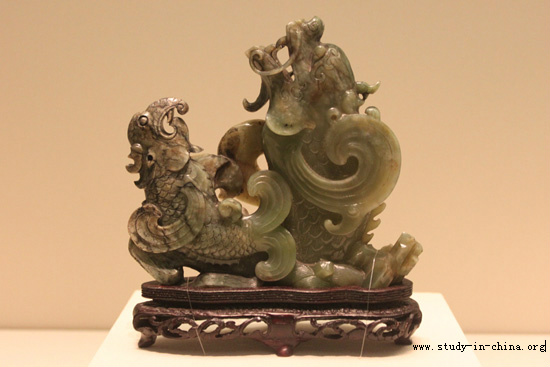| Home > China Feature |
Why are Chinese so Concerned About Saving Face?
Mianzi, or face is something that Chinese people think about more than any other. Be it the nation's leaders, or its common citizens, the consideration of saving face is always the first thing they think about before they act. Since face is so important, it's worth asking, what exactly is it?
What is face?
If you check a dictionary, you'll see that the original intended meaning ofmianzi (面子) was a noun for the face, surface, or exterior of something. Later, the meaning of the word extended to include someone's feelings or the face value of something. Finally, the word came to mean "fame", "prestige" or "reputation". In the daily lives of Chinese people, the meaning of face is particularly complicated, as giving face (or not) to someone oftentimes isn't communicated directly through words, but is instead something that must be perceived through actions. The absolute concern over saving face (sometimes taken to the extreme) has truly remained a cultural phenomenon unique to Chinese people, and today it's one of the few social elements left that is still inextricably linked with Chinese traditions that are thousands of years old. Unsurprisingly, foreigners upon seeing face-saving measures in action sometimes cannot help but shake their heads and judge it wholly excessive.
"Do not wash your dirty linen in public"
There's a common saying in China that you "do not wash your dirty linen in public" (家丑不可外扬). This saying is synonymous with that of saving face. When something disgraceful happens that could be harmful to the family name or the family, such as an unruly child, domestic abuse, a uxorious husband etc., Chinese would rather repress their feelings inwardly than speak out, for fear that if others knew that they would lose face, and be ridiculed (in broader terms, such "disgraceful" events that happen within China being leaked internationally can also be considered as losing face). This absolute concern about outward appearances can be taken to such extremes that people’s lives become a living hell. For example, when Chinese mediate their domestic disputes, you'll oftentimes hear the following phrase: "swallowing a broken front tooth" (打破门牙往肚里咽), which is to say that they'd rather swallow their own tooth than spit it out and lose face in front of others.
Face as moral integrity?
Saving face can also manifest itself as a form of moral integrity, as seen in such phrases as: "I'd rather starve to death than be disloyal" (饿死事小,失节事大) or "It's better to be destroyed than give up your principals, it's better to die in glory than live in dishonour" (宁为玉碎,不为瓦全). Although equally extreme, concern over this kind of mianzi is at least somewhat admirable. However, more often than not, Chinese people’s concern of saving face really only refers to the concern of saving their own, their family’s or their friend's face, and they could care less about the face of strangers, perhaps even intentionally hurting it. There’s a saying for that too: "good deeds don't leave the house, bad deeds travel thousands of miles" (好事不出门,坏事行千里). Stories from day-to-day life seem to confirm this point: some people are so bored that they cause others to lose face just to pass the time.
Saving face, taken to extremes
1) The happily married couple
Long ago, I was told a near-ridiculous story. An old married couple, who had been together for many decades, had never argued with each other. They had no children, and no one had ever seen either of them do anything unseemly. Nearly all of the people who lived in the area thought that they were the textbook definition of a "harmonious couple" (夫妻和睦), and that their life together must be quite happy. In fact, since their wedding day, this happy old couple had never slept in the same bed, and had never been able to express their feelings to one another. Yet, the vanity for both sides was so strong, and they cared so much aboutsaving face that they never let any of this known, and they absolutely refused to get divorced, so life just dragged on, and on. All for the sake ofsaving face, they each wore a smile in front of others, while they dried their tears in private.
2) "Treating" and "gifting"
To save face, Chinese people often "treat" others, trying to act bigger than they truly are (打肿脸充胖子). Regardless of whether it is to please a single person or a room full of people, they’ll always usher the waiters to fill teapot or bring another dish out to the already full table, all the while repeatedly apologizing that "there's not enough food". To save face, it is said that Chinese people must "break the pan to sell the iron" (摔锅卖铁) to afford constantly giving gifts to others, and the number of gifting occasions is seemingly endless: weddings, a baby's first month, a 10th birthday, a 40th birthday, a school graduation, enlisting in the military, receiving a job promotion, moving into a new house, birthdays etc. That is to say, saving face causes Chinese people to "eat losses"; they must constantly grin and bear it, for fear that if they don’t, others will gossip about them being stingy. This concern over saving face can even lead people to break the law, get arrested and be carted off to jail.
3) Face and business
All Chinese people are aware that some will "use dirty tricks to mislead their friends" (鬼迷熟人). This saying describes when a consumer continues to buy something from an acquaintance or friend despite being deceived and taken advantage of constantly (via paying for defective, inferior, sub-standard or even dangerous products). Why do such situations keep happening? In short, because Chinese people are so concerned about saving face, they'd rather let their friends cheat them, than yell at them and have people think that they have no self-restraint or lack class. Of course, many businesspersons thoroughly understand this, and make money by deliberately deceiving their friends. China's problematic "debt chain" phenomenon (such as in Wenzhou) is also closely related with company bosses saving face: they'd rather borrow money from multiple parties at increasingly unsustainable interest rates than have others know that their company is broke.
Face throughout history
Chinese people have long held face in the highest regard. As early as the Spring and Autumn Period, there was the "Lintong Dou Bao" story (临潼斗宝), now used as an idiomatic phrase meaning "to show off one's wealth". In the Eastern Jin Dynasty, there were the "Shichong Doufu" and "Guojiu Doufu" stories (石崇和国舅斗富) about competing with each other for wealth. The last emperor of the Sui Dynasty, Yang Di had trees bound in expensive silks and frequently treated guests to fine meals to exert his face-ness. And in more modern times, the list of extravagant face-saving gestures is simply too long to mention.
Is it worth it?
Ostensibly, the act of giving or not giving face – regardless of time, place, or situation – is a unilateral decision. But in reality, face is a bilateral affair. If one person doesn't pay attention to the other person's face, then that other person will not be obligated to return the face, or deal with the constraints of doing so. That is to say, the ones who lose are invariably the ones who are concerned about face: even if you think that suffering financial losses is unimportant as compared to the loss of face, other people will still think that you're stupid and foolish.
Art
 more
moreChina Beijing International Diet ...
Recently, The hit CCTV documentary, A Bite of China, shown at 10:40 ...

Exhibition of Ancient Chinese Jad...
At least 8,000 years ago, Chinese ancestors discovered a beautiful...

Longmen Grottoes
The Longmen Grottoes, located near Luoyang, Henan Province, are a tr...

Custom
 more
moreWeb Dictionary
Martial Arts
Tai Chi Master Class Held in Moscow
MOSCOW, June 15, 2016 (Xinhua) -- Students learn from Shaolin ...
Celebriting 70 years' efforts in restoring Mogao...
Work is being carried out at the restoration site of cave No 98 a...
Hong Kong Children's Symphony performs in Seattle
Under the theme of Tribute to the Golden Age, a concert featuring a ...





 print
print  email
email  Favorite
Favorite  Transtlate
Transtlate 








